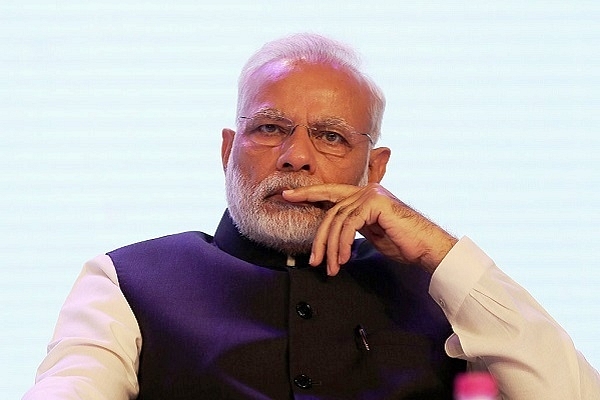Economy
Tweaking Companies Act: Why Warming Up To India’s Wealth Creators Is A Welcome Step
- The decision to repeal laws and now to decriminalise most offences under the Companies Act sends a strong message to businesses and investors that India respects its wealth creators.
- This structural shift is very likely to have far-reaching consequences for India’s economic growth potential over the next couple of decades.

Prime Minister Narendra Modi. (Dan Kitwood/Getty Images)
India’s economic policy has witnessed a remarkable change over the last couple of decades. The process started from the 1980s as the government started to gradually embrace private capitalism. India’s sharp increase in per capita real gross domestic product (GDP) coincided with this period and this is illustrating the important role played by India’s wealth creators in our development.
Despite the relative importance of India’s private sector in development, there has been a tendency to view private enterprise with an eye of suspicion. The process of embracing capitalism has been on since decades, but it has been so slow that till date lot of the provisions of our laws continue to criminalise violations of the Companies Act of India.
Historically, the Indian government has been consistently wary of private capital and it has often taxed capital gains thereby disincentivising wealth creation. However, India’s economic history will remember five critical moments which have had (or will have) far-reaching positive economic consequences for the country.
The first will be the 1980s when former prime minister Indira Gandhi did a departure from her previous socialist policies. Indira 2.0 was very different from the Indira Gandhi who was committed to the socialist Nehruvian economic policies. Some may even argue that Indira 2.0 would have never undertaken a decision like bank nationalisation – but we obviously won’t have an answer to that.
The second moment is the 1991 reforms by the P V Narasimha Rao government with Dr Manmohan Singh as finance minister. It is unfair to not acknowledge the contribution of Dr Singh to the 1991 reforms but the fact that he as prime minister was a non-reformer only raises questions with respect to whether he believed in the 1991 reforms or were they purely driven by Rao.
Either way, the 1991 reforms were a departure from the past blunders, and it promised a new era of economic reforms.
However, these new reforms were carried out only when former prime minister Atal Bihari Vajpayee led National Democratic Alliance government served for a full five years from 1999-2004.
India saw an unprecedented push towards development of infrastructure, further embracing private capitalism and entrepreneurial spirit. We saw many big-ticket privatisations during these five years thereby making it one of the most definitive historical moments in Indian economic history.
Despite the steady progress over nearly four decades, Indian capitalism was never completely embraced until 2014 when Narendra Modi took oath as India’s Prime Minister. Since then we have seen an unprecedented thrust on improving India’s ease of doing business.
Several regulatory and procedural reforms were initiated that are aimed at making business a hassle-free environment. There has been a substantial reduction in corporate tax rates for Indian businesses during this period, and we have also seen an unprecedented focus on greater engagement between industry bodies and government from time to time so that their concerns can be adequately addressed.
All this point at a renewed understanding with respect to the importance of private entrepreneurs in the India growth story. Reports have emerged that the government further plans to decriminalise nearly two-thirds of the offences under the Companies Act. This will go a long way in further winning the confidence of industry and alleviating their fears with respect to overzealous regulators and tax officials.
We know that on tax officials the government has already put in place a new system of faceless assessments. There is a systematic overhaul of the way business and government interact in India. The decision of the government has reinforced their belief with respect to the need for limited interface between government and businesses, thereby reducing red tape.
The decision to repeal several old laws and now to decriminalise most offences under the Companies Act is historic in the sense that it sends a strong message to Indian businesses and investors and the message is that India respects wealth creators.
Further, reduction of penalties for small companies that are often unaware of most such provisions and lack the means to hire high-value consultants or accountants is a sign that government acknowledges that genuine mistakes can be made. It further sends a signal that government is being accommodative and helpful to firms that make these mistakes.
If one analyses the last six years, we will find one of the most definitive structural shifts in India’s approach towards its entrepreneurs and this shift is very likely to have far-reaching consequences for India’s economic growth potential over the next couple of decades.
Support Swarajya's 50 Ground Reports Project & Sponsor A Story
Every general election Swarajya does a 50 ground reports project.
Aimed only at serious readers and those who appreciate the nuances of political undercurrents, the project provides a sense of India's electoral landscape. As you know, these reports are produced after considerable investment of travel, time and effort on the ground.
This time too we've kicked off the project in style and have covered over 30 constituencies already. If you're someone who appreciates such work and have enjoyed our coverage please consider sponsoring a ground report for just Rs 2999 to Rs 19,999 - it goes a long way in helping us produce more quality reportage.
You can also back this project by becoming a subscriber for as little as Rs 999 - so do click on this links and choose a plan that suits you and back us.
Click below to contribute.
Latest